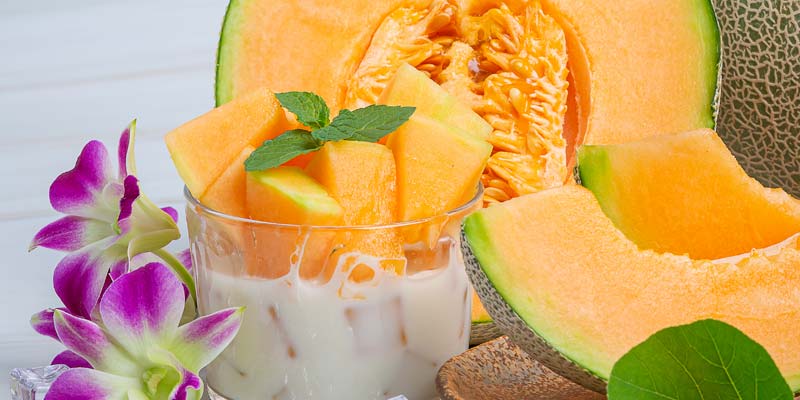Cantaloupes, also known as muskmelons, are not only delicious but also packed with numerous health benefits. This nutrient-dense fruit is an excellent addition to any diet, providing a plethora of vitamins, minerals, and antioxidants. In this blog, we will delve into Cantaloupe Nutrition, its health benefits, and how you can incorporate them into your daily diet. Whether you’re a health enthusiast or just curious about the benefits of this melon, this guide will provide you with all the information you need.
What is a Cantaloupe?
A cantaloupe is a type of melon from the Cucurbitaceae family. It is characterized by its netted rind and sweet, orange flesh. There are two main varieties: the European cantaloupe (Cucumis melo cantalupensis) and the North American cantaloupe (Cucumis melo reticulatus). Both varieties are rich in nutrients and have a distinct, aromatic flavor.
Nutritional Profile of Cantaloupe
A serving of one cup of raw cantaloupe balls (177g) offers 60 calories, 1.5g of protein, 14.4g of carbohydrates, and 0.3g of fat. Cantaloupe is rich in essential nutrients such as vitamin C, vitamin A, and potassium. These nutritional details are sourced from the U.S. Department of Agriculture (USDA).
Carbohydrates
In a 1-cup serving of cantaloupe, you’ll find 14.4 grams of total carbohydrates, including 1.6 grams of fiber and approximately 14 grams of natural sugar. Cantaloupe contains both insoluble and soluble fiber.
Due to its natural sugar content, cantaloupe has a glycemic index of 65. However, its glycemic load, which considers serving size, is only 4, thanks to its high water content.
Fats
Similar to most fruits, cantaloupe contains negligible amounts of fat.
Protein
Cantaloupe offers a modest amount of protein, with 1.5 grams per cup, making it an insignificant source of this nutrient.
Vitamins and Minerals
Rich in essential nutrients, cantaloupe provides potassium, calcium, magnesium, phosphorus, zinc, and vitamins C, A, and B9 (folate). One cup of cantaloupe contains 72% of the daily recommended intake of vitamin C based on a 2,000 calorie per day diet, and 33% of vitamin A.
Calories
A 1-cup serving of raw cantaloupe balls (177g) contains 60 calories. These calories derive mostly from carbohydrates (87%), followed by protein (8%), and fat (5%). Cantaloupe is considered a low-calorie, water-rich food.
Health Benefits of Cantaloupe

Boosts Immunity
Thanks to its high vitamin C content, cantaloupe can significantly boost the immune system. Vitamin C stimulates the production of white blood cells, which fight off infections.
Supports Eye Health
Cantaloupe is excellent for eye health due to its high beta-carotene content. The vitamins that give carrots their orange color also contribute to the color and benefits of cantaloupe. Besides beta carotene, cantaloupe contains lutein and zeaxanthin, two fat-soluble antioxidants classified as xanthophylls.
Although lutein and zeaxanthin are not converted to vitamin A, they still offer significant benefits for eye health, particularly for the macula. Including cantaloupe in your diet can provide essential nutrients for maintaining healthy eyes.
Promotes Skin Health
The combination of vitamins A and C in cantaloupe contributes to healthy, glowing skin. Vitamin A encourages skin cell regeneration, while vitamin C aids in collagen production, keeping the skin firm and elastic.
May Aid in Lowering Cancer Risk
The potent antioxidant activity found in cantaloupe aids in neutralizing free radicals, preventing potential damage. Studies have revealed that extracts from cantaloupe’s peel and seeds have demonstrated an ability to hinder the growth of tumor cells in areas such as the kidney, colorectal region, and cervix.
The antioxidant properties present in both the fruit and peel have been shown to inhibit tumor spread by percentages ranging from 20% to 85%. However, it’s important to note that this study is preliminary and lacks conclusive evidence. Further research is required, yet the findings offer promising prospects for future investigations.
Prevents Dehydration
In addition to drinking plenty of water, consuming high-water-content fruits like cantaloupe can help maintain hydration. Cantaloupe, which is over 90% water, makes an excellent snack on a hot day. It is also rich in the electrolyte potassium.
According to Gordon B. in “How much water do you need?” from the Academy of Nutrition and Dietetics, potassium is highlighted as a dietary component of public health concern in the USDA’s 2020–2025 Dietary Guidelines, as studies indicate that people in the U.S. typically consume less potassium than recommended.
Reduces Inflammation
The antioxidants in cantaloupe can help reduce inflammation in the body. Chronic inflammation is linked to numerous health conditions, including heart disease and arthritis.
Supports Heart Health
Cantaloupe is a heart-friendly fruit due to its high potassium and low sodium content. Potassium helps regulate blood pressure by balancing out the effects of sodium, while fiber helps reduce cholesterol levels.
How to Select and Store Cantaloupe
Selecting the Perfect Cantaloupe
When choosing a cantaloupe, look for one that feels heavy for its size and has a sweet, fruity aroma. The rind should be firm, with a uniform net-like texture. Avoid cantaloupes with soft spots, cracks, or overly green coloring.
Storing Cantaloupe
To store a whole cantaloupe, keep it at room temperature until it ripens. Once ripe, it can be stored in the refrigerator for up to five days. Cut cantaloupe should be stored in an airtight container in the fridge and consumed within three days.
Delicious Ways to Enjoy Cantaloupe
Fresh and Raw
Enjoy cantaloupe as is by slicing it into wedges or cubes. It makes a refreshing snack on a hot day or a delightful addition to a fruit salad.
Smoothies
Blend cantaloupe with other fruits like bananas, strawberries, and a splash of orange juice for a nutritious and hydrating smoothie.
Salads
Add cantaloupe to green salads for a burst of sweetness. It pairs well with ingredients like feta cheese, mint, and balsamic glaze.
Desserts
Incorporate cantaloupe into desserts such as sorbets, and fruit tarts, or simply drizzle it with honey for a healthy treat.
Breakfast
Combine cantaloupe with yogurt, granola, and a sprinkle of nuts for a balanced and delicious breakfast option.
Grilled
For a unique twist, try grilling cantaloupe. The heat enhances its natural sweetness and adds a caramelized flavor. Serve it with a dash of lime juice and a sprinkle of chili powder for a savory-sweet dish.
Cantaloupe Recipes to Try
Cantaloupe Smoothie
Ingredients:
- 1 cup cantaloupe, diced
- 1 banana
- 1/2 cup Greek yogurt
- 1/2 cup orange juice
- 1 tablespoon honey (optional)
- Ice cubes
Instructions:
- Place all ingredients in a blender.
- Blend until smooth.
- Serve immediately.
Cantaloupe and Prosciutto Salad
Ingredients:
- 2 cups cantaloupe, cubed
- 4 slices prosciutto, torn into pieces
- 1 cup arugula
- 1/4 cup feta cheese, crumbled
- 2 tablespoons olive oil
- 1 tablespoon balsamic glaze
- Salt and pepper to taste
Instructions:
- In a large bowl, combine cantaloupe, prosciutto, arugula, and feta cheese.
- Drizzle with olive oil and balsamic glaze.
- Season with salt and pepper.
- Toss gently and serve.
Conclusion
Cantaloupes are a versatile and nutritious fruit that can easily be incorporated into a variety of dishes. Their rich vitamin, mineral, and antioxidant content make them a valuable addition to any diet, offering numerous health benefits from boosting immunity to promoting heart health. By understanding how to select, store, and prepare cantaloupe, you can enjoy its sweet flavor and health advantages all year round. Embrace the goodness of cantaloupe and make it a staple in your healthy eating plan.
Incorporating cantaloupe into your diet can provide a refreshing and nutrient-packed boost to your daily intake. Whether enjoyed fresh, blended into smoothies, or added to salads, this delicious melon is a simple and tasty way to enhance your overall health and well-being.
FAQs
Q1. Which is healthier, watermelon or cantaloupe?
Cantaloupe has more vitamin C, which boosts the immune system, than watermelon. It also contains lutein and zeaxanthin, antioxidants that help prevent macular degeneration, a condition where the retina deteriorates. Additionally, cantaloupe is rich in beta-carotene, which the body converts into vitamin A, beneficial for both eyesight and skin health.
Q2. Is cantaloupe a Superfood?
Cantaloupe is considered a superfood due to its low calorie count and high nutritional value. It’s low in carbs and contains about 90 percent water, making it both hydrating and filling.
Q3. Is it OK to eat cantaloupe everyday?
Incorporating cantaloupe into your daily diet provides all the essential nutrients needed for your body to function properly. Packed with vitamins, minerals, and antioxidants, cantaloupes are enjoyed by both children and adults.
Q4. Is cantaloupe high in sugar?
Cantaloupes owe their orange color to their high vitamin A content. One cup of this tasty melon contains less than 13 grams of sugar. Although this is slightly more than some other fruits, it is significantly less than the nearly 40 grams of sugar found in a 12-ounce can of soda, which offers very little nutritional value.

